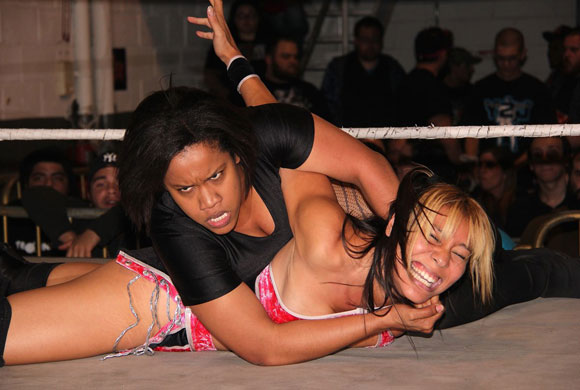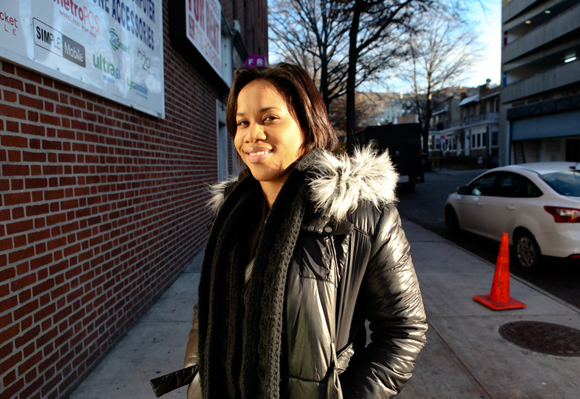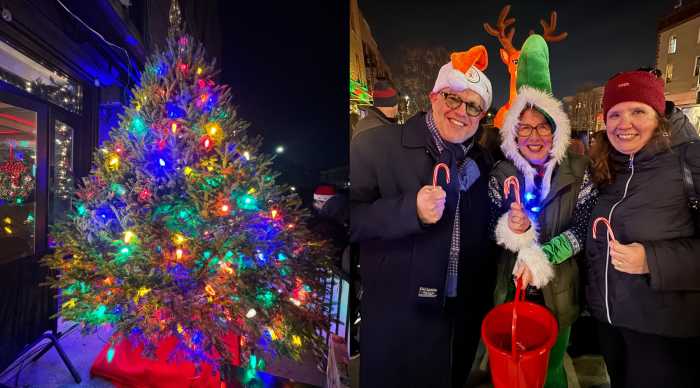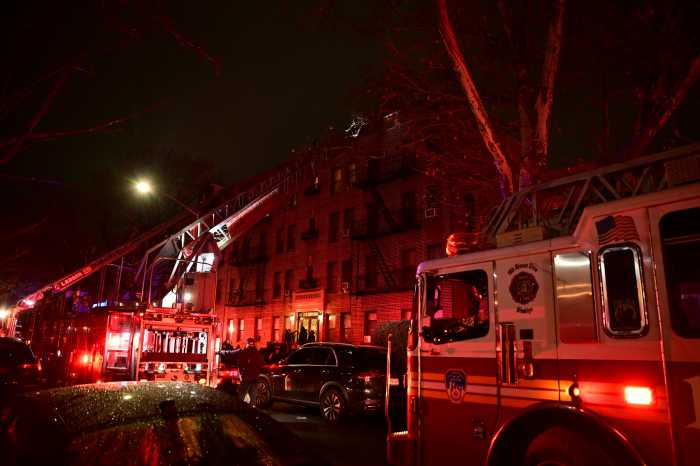When Bonesaw Jessie Brooks steps in the ring, she doesn’t say a word. She glowers, chops her opponent across the chest, grapples, and often, suplexes the unlucky foe and holds on, bent over all the way backwards as her rival squirms like a mouse under a boot-heel for the three-count. Wrestling aficionados also know her as “the Baddest Woman on the Planet.”
“She’s competitive, she’s tough as nails, and very much has a ‘take no prisoners’ mentality, which I think is very apparent to anybody who is able to watch any of her matches,” fellow professional wrestler Kacee Carlisle said.
When I meet her at a Starbucks near her Bay Ridge home, Brooks looks less tough. Real name Jessyka Perea, her face is tense, hands clamped between her knees during our interview. But one thing is consistent with her ring demeanor. She doesn’t speak much. The talking is largely left to Kris Levin, co-owner of Valkyrie Women’s Professional Wrestling, a Brooklyn-centric, independent promotion with all-female talent that Brooks and Carlisle are part of. In an hour and a half of combined interviews, Brooks won’t speak unprompted, and her answers will seldom if ever last longer than 10 seconds.
Valkyrie got started early last summer. Women’s pro wrestling was illegal in New York for decades and the ban wasn’t lifted until 1972. But no archival material that Levin or I could find indicates that there has ever been an all-women promotion in the five boroughs. As a longtime pro-wrestling referee and fan, he had trouble comprehending that.
“What shocked us was that not only was this the first women’s wrestling event in Brooklyn, but it was the first ever in New York City,” Levin said.
Pro wrestling during the past several decades has emphasized swimsuit looks over grappling aptitude, but it was not always so. Levin blames the advent of television.
“When you watch wrestling on TV, it’s all women in bikinis, women who are models,” he said. “It’s not women who treat it as a real sport.”
Levin, Brooks, and the rest of Valkyrie are trying to swing the pendulum back. Levin is scrawny with wavy hair and a mustache, and has a vaudevillian look when he suits up in a ref uniform. Brooks’s wrestling outfit, a black leotard accented only with a golden sash, would not seem out of place in archival footage of a match from the 1950s. A typical Valkyrie show includes a stable of local talent and a handful of wrestlers flown in for the night, all performing modern pro wrestling’s careful ballet of violence. Comic-book plot-lines and crowd interaction make it clear as a boot-print who is a baby-face, or good guy, and who is a heel.
Valkyrie is coming up on its fifth show, its first outside of Ludus Wrestling Center in Sunset Park, which seats about 90. It is not in danger of hitting prime time anytime soon. But an October event was packed and the crowd, 90 percent male, was enthusiastic, chanting things like “This is awesome!” And, at a heel: “You have herpes!” And, during Brooks’s match: “This is wrestling!” There were only a few brief moments of decidedly heel-ish butt-shaking in three action-packed hours.
Brooks, who looks burlier in the ring, if not taller than her 5-foot-4, 125-pound billing, is 3-1 in the new league. The outcomes of matches may be predetermined, and having a winning streak may be referred to in the industry as “getting put over,” but title belts command higher fees, increase T-shirt sales, and define job prospects. So for Brooks it matters that, to the small but devoted group of fans paying attention, she is one of the women in the New York indie wrestling scene to beat.
Getting to this point was not a sure thing. Brooks was a wrestling fan growing up in Borough Park — her mom and aunt were casual followers who loved Hulk Hogan, she was more of a Randy Savage girl. But it wasn’t until she was a junior at Purchase College, majoring in political science, that she considered it might be something she could do.
“Somebody told me there was a wrestling school in Pennsylvania and the next week I was taking classes,” she said.
That school is run by Ring of Honor, a middle-of-the-road, American-style indie promotion that has its matches screened on dozens of local TV stations nationwide and has groomed several wrestlers for the big-time in recent years. Its gym is in a small town off Interstate 95 between Trenton and Philadelphia. Brooks trained there two or three days a week for a year, squeezing the bus and train rides, four hours each way, into a full college schedule. When she started, she kept to herself, to an extreme, according to one of her trainers.
“When she came in she was super quiet, super reserved. She rarely spoke — which is good,” said Hunter Johnston, who wrestles as Delirious and runs the league. “In wrestling you want to keep your mouth shut and your ears open. But she was so quiet, there was a while there where I didn’t think this was going to work.”
Still, Brooks kept showing up, and her persistence set her apart from the bulk of new arrivals at the school, who typically stop coming within weeks, according to Johnston.
“The majority quit,” he said. “Jessie is an exception.”
And then she had a breakthrough.
“One day out of nowhere it all clicked and her intensity level and her passion that she would exude in the ring all came out,” Johnston said. “It was like a lightbulb went on.”
Suddenly, “when she gave a chop in your chest it would be like a saw cutting through your bone,” he recalled. Jess Perea, the wannabe wrestler who had come as all new students do, without a stage name, became Bonesaw Jessie Brooks.
During his 15 years in the business, Johnston says he has seen the acceptance of women’s wrestling in indie wrestling grow.
“Over the years, female wrestling has been accepted much more for its athleticism and competition and skill whereas years ago female wrestling was more of a dog-and-pony show to spotlight the attractiveness of women,” he said. “Of course looks still play a role. They play a big role.”
Making a living as a pro wrestler of any gender is tough. The biggest show going is World Wrestling Entertainment, which pays its athletes enough that they don’t work day jobs, and schedules them such that they can’t, but is notorious for keeping wrestlers listed as independent contractors and forcing them to pay for their own travel, not to mention their own health insurance. Because of its reputation and the constant travel it requires of wrestlers, Brooks says she wouldn’t take a job there under any circumstances.
“I wouldn’t want to deal with a lot of the drama that goes into that,” she said.
Instead, she aspires to wrestle in Japan, because of how fans and promoters there approach the sport.
“They treat women as equal to men and take women’s wrestling seriously,” Brooks said.
For now, she’s working as a home health aide and wrestling a handful of times per month, with Valkyrie and other independent promotions, mostly in the Northeast. She wrestled once for Ring of Honor, after debuting in its developmental league in New Jersey. In four years, the sport has taken her as far as the Chicago suburbs, the home base of Shimmer, a women’s promotion that tapes events three times a year, and Georgia, where someone told her she has a Brooklyn accent — she doesn’t.
Lately, she has been getting help hyping the crowd from Julius Smokes, the Devil’s Son-in-Law, a seasoned wrestler and East New York native who boasts that he is the industry’s “original hip-hop manager” and who for years backed Fort Greene’s Homicide, a big name in Ring of Honor. During Brooks’s matches, Smokes stalks the perimeter of the ring, banging on the mat, barking like a dog, and mimicking the sound of a burst of automatic gunfire (“Brrrrat!”)
Smokes is African American and Brooks has Colombian and African ancestry. As a manager talking trash, Smokes frames rivalries in racial terms — he calls himself and Brooks “ebony diamonds,” and favors boasts that involve food. In a promo video ahead of Brooks’s match against fellow Ring of Honor alum Mia Yim, who is of Korean and African descent, he bellows, “We like our chicken wing deep-fried, not that soggy Chinese food.” And, in assessing his and Brooks’s prospects in 2015: “It’s going to be the year of the pork chops and the collard greens.”
Carlisle said that Brooks’s soft-spokenness could be a handicap in the long run.
“Nowadays there’s a lot of emphasis on being able to give a good interview,” she said.
On that front, Smokes said Brooks has her work cut out for her, to a point.
“If she wants to step out into the limelight she definitely needs to step it up, but at the same time that is where Julius Smokes comes in,” he said.
Johnston said she can do just fine playing the silent-but-deadly ring assassin.
“The serial-killer style demeanor when she’s in the ring, that’s what you emphasize,” he said.
Her withering glare, Brooks said, took no practice. But when it comes to career aspirations, Smokes hopes she can come around on World Wrestling Entertainment.
“Her and I could go to the next level. This is bigger than Valkyrie. I don’t know if she knows it yet,” he said.
On a recent Friday Brooks was practicing with Levin at Gorilla Training Camp, a boxing and pro-wrestling gym a few-minute walk from the Bushwick line, in a part of Queens where single-family homes share blocks with one-story factories. Levin was nursing a bum hip – he said the joint “went out” the week prior. This was the pair’s third time practicing there, having decamped from Ludus in Sunset Park for reasons they don’t want to disclose, and the false ceiling was too low for a demonstration of Brooks’s signature suplex. She was also under time pressure, having to cut the session down to two hours to attend a field trip in the city with her massage-school class.
Brooks and Levin stuck to chain wrestling, a training technique where two wrestlers grapple and improvise their way through a sequence of holds, communicating only through whispers, and not often, each submission hold giving way to an inventive escape and reversal. Forty-five minutes in, Brooks was leaning against the ropes for a portrait by our photographer and Levin told her to “give him your wrestler face.”
When they resumed training and Brooks was holding Levin in a camel-clutch, with him face-down, and her grabbing him by the chin and yanking back, I realized that she was grinning, and had been almost the entire time.




























